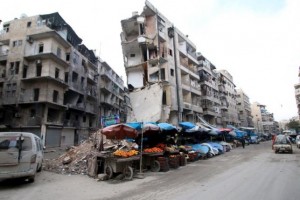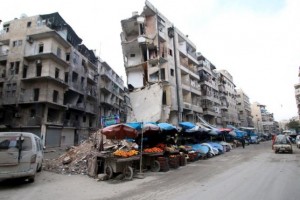
MOSCOW, February 11: Russia says it is ready to discuss a ceasefire in Syria as foreign ministers gather in Munich, Germany to seek an end to a bloody civil war that has devastated the Arab country.
The U.S., Russia and other members of the 17-nation International Syria Support Group are holding a series of talks on the sidelines of the Munich Security Conference.
A focal point for the group is the Russian proposal for a cease-fire in Syria, where a Russian-backed Syrian offensive in Aleppo has worsened a humanitarian crisis by forcing thousands of civilians to flee towards the Turkish border.
“We are ready to discuss the modalities of the ceasefire,” said Russian Deputy Foreign Minister Gennady Gatilov, according to the Tass news agency. Western media reports said the proposal called for a March 1 cease-fire.
State Department spokesman Mark Toner said he was not aware of a specific date for the Russian proposal but stressed “I think our preference would be for an immediate cease-fire.”
U.S. Secretary of State John Kerry is holding a series of meetings in Munich, with officials including Russian Foreign Minister Sergey Lavrov.
He is also meeting with Syrian opposition leader Riyadh Hijab, head of the Syrian High Negotiating Committee, ahead of a full meeting of the International Syria Support Group.
On Wednesday, Hijab led an opposition delegation that met with British Foreign Secretary Philip Hammond and other officials in London.
He said Syrian people needed to see progress in areas including the implementation of a U.N. Security Council resolution that calls for a cease-fire and talks on a political transition.
The first round of proximity talks between the Syrian government and opposition stalled earlier this month, partly due to opposition complaints about the Russian-backed Syrian government’s relentless bombing campaign in Aleppo.
In spite of ongoing criticism of the Syrian and Russian airstrikes against non-Islamic State targets, European diplomats said that they are skeptical of the Russian offer of a ceasefire.
“This is straight out of the Kremlin’s playbook,” said a senior European Union diplomat. “Look at Ukraine, ceasefires, offers of solutions but meanwhile on the battlefield a continued pressure.”
A Turkish official said that Russia might be putting forward a cease-fire plan now because it had completed a phase of their military operations in Aleppo.
“Now the can focus on re-focusing and preparing for the next stage – Idlib,” the official said.
Relief organizations have also criticized the ongoing siege in Aleppo, which is unfolding as world powers seek a political resolution.
Nearly 100,000 Syrians have fled from their homes since last week’s international donor’s conference on Syria, said International Rescue Committee President David Miliband.
He said the ongoing humanitarian crisis is “making a mockery of the international community’s commitment to help Syrians.”
In Washington, State Department spokesman Mark Toner said U.S. officials would not comment on the Russia plan before the talks in Munich.
“That’s going to be an opportunity for us to really engage with the other members of the ISSG – the International Syria Support Group – to talk about, frankly, some of the urgent issues that we’re confronted with on Syria, said Toner.
U.N. Special Envoy for Syria Staffan de Mistura, who is in Munich, has announced intentions to resume the U.N.-facilitated talks between the government and the opposition on February 25. However, those plans hinge on whether world powers can make sufficient progress in efforts to secure a ceasefire and provide humanitarian access to affected civilians.
“The most important thing is to somehow pressure the Russians and the Syrians to stop the aerial bombardments which are causing these floods of refugees,” said former U.S. ambassador to Syria Robert Ford.
However, he added that to date, the U.S. had not shown any “willingness to genuinely pressure Russia.”-Agencies



